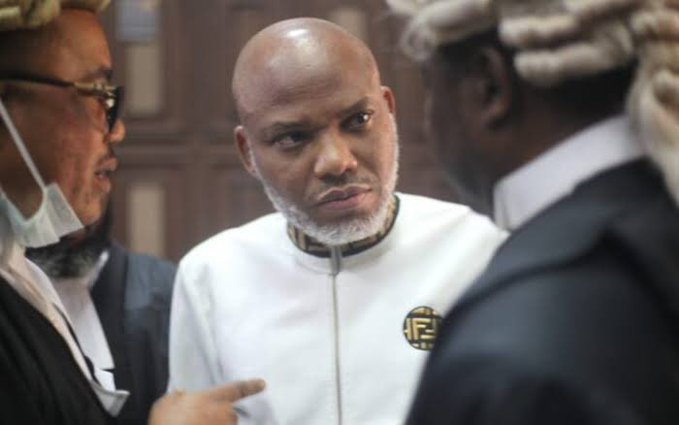Politics
Legal Experts Tear Apart Nnamdi Kanu Ruling, List 10 Major Flaws That Could Nullify the Judgment on Appeal
Legal and constitutional experts have raised alarm over Justice James Omotosho’s ruling on IPOB leader Nnamdi Kanu, describing it as riddled with jurisdictional errors, constitutional breaches.

- Legal and constitutional experts have raised alarm over Justice James Omotosho’s ruling on IPOB leader Nnamdi Kanu, describing it as riddled with jurisdictional errors, constitutional breaches, and procedural irregularities—faults they say make the judgment too defective to stand on appeal.
Legal analysts and constitutional experts are raising serious concerns over the recent judgment delivered by Justice James Omotosho of the Federal High Court, Abuja, in the case involving detained IPOB leader, Mazi Nnamdi Kanu.
A detailed review of the ruling reveals multiple procedural lapses and constitutional violations that, according to experts, severely undermine the validity of the judgment.
Below is a simplified breakdown of the key issues highlighted:
1. Failure to Decide Jurisdiction Before Proceeding
Kanu’s legal team challenged the court’s jurisdiction—a mandatory legal hurdle in criminal proceedings. Instead of addressing it, Justice Omotosho proceeded with the case.
Legal experts stress that any trial conducted without resolving jurisdiction is null and void, rendering the entire process defective.

2. Directing Objections to a Final Address, Then Blocking It
The judge instructed the defence to include all objections—including jurisdictional issues—in the final written address.
However, when the time came:
- The court blocked the filing of final addresses
- Judgment was delivered without hearing the objections
This, analysts say, constitutes a clear breach of fair hearing.
3. No Written Rulings on Key Applications
Several defence motions were filed before judgment, including those relating to:
- Illegal rendition
- Abuse of court process
- Double criminality
- Repealed statutes
- Defective charges
Justice Omotosho issued no written rulings on any of these applications. Experts note that judges are legally required to provide written decisions—failure to do so is a fatal procedural error.
4. Forcing Kanu to Plead Under a Repealed Law
Although the judge acknowledged that the Terrorism Prevention Act 2013 had been repealed, he still compelled Kanu to plead to charges framed under it.
Legal scholars maintain that a repealed law cannot sustain a criminal charge, making the proceedings invalid.
DON’T MISS: BREAKING: Nnamdi Kanu Sentenced to Life Imprisonment
5. Violating Section 36(12) of the Constitution
The Constitution states:
No one may be convicted of an offence not clearly defined in an existing written law.
Analysts say the judge relied on:
- Allegations not contained in the charge
- Claims unsupported by evidence
- Accusations not made by any witness
One example is the claim that Kanu plotted to bomb foreign embassies during EndSARS—an allegation never mentioned by the prosecution.

6. Elevating a “Savings Clause” Above the Constitution
The court leaned on a savings clause in the new Terrorism Act that allows old cases to continue.
Experts argue:
- A savings clause cannot override the Constitution
- A repealed law remains repealed
- No one may be tried under an expired law
This interpretation, they say, contradicts legal hierarchy.
7. Ignoring the Mandatory “Double Criminality” Test
Since the government alleged Kanu committed crimes in Kenya, Nigerian law requires proof that the alleged acts are also crimes in Kenya.
No such evidence—police reports, witnesses, or documentation—was presented.
Analysts say the court avoided this necessary test altogether.
8. Denial of Fair Hearing Makes the Judgment Void
Blocking final addresses, ignoring objections, and failing to rule on motions all amount to denial of fair hearing.
Under Nigerian law, any ruling reached under such circumstances is automatically void.
9. Introducing Claims With No Evidence
Experts describe as “alarming” the judge’s introduction of claims—such as plans to bomb foreign embassies—that:
- Were not charged
- Had no witnesses
- Were not in any prosecution filings
- Had no investigative backing
They say this violates judicial ethics and raises concerns about impartiality.
10. Conclusion: Experts Say the Judgment Cannot Survive Appeal
Based on the documented flaws—jurisdictional errors, constitutional violations, reliance on repealed laws, and introduction of extraneous claims—legal experts say the judgment is unlikely to withstand appellate review.
They also warn that the ruling raises broader concerns about judicial accountability and constitutional safeguards in politically sensitive cases.























